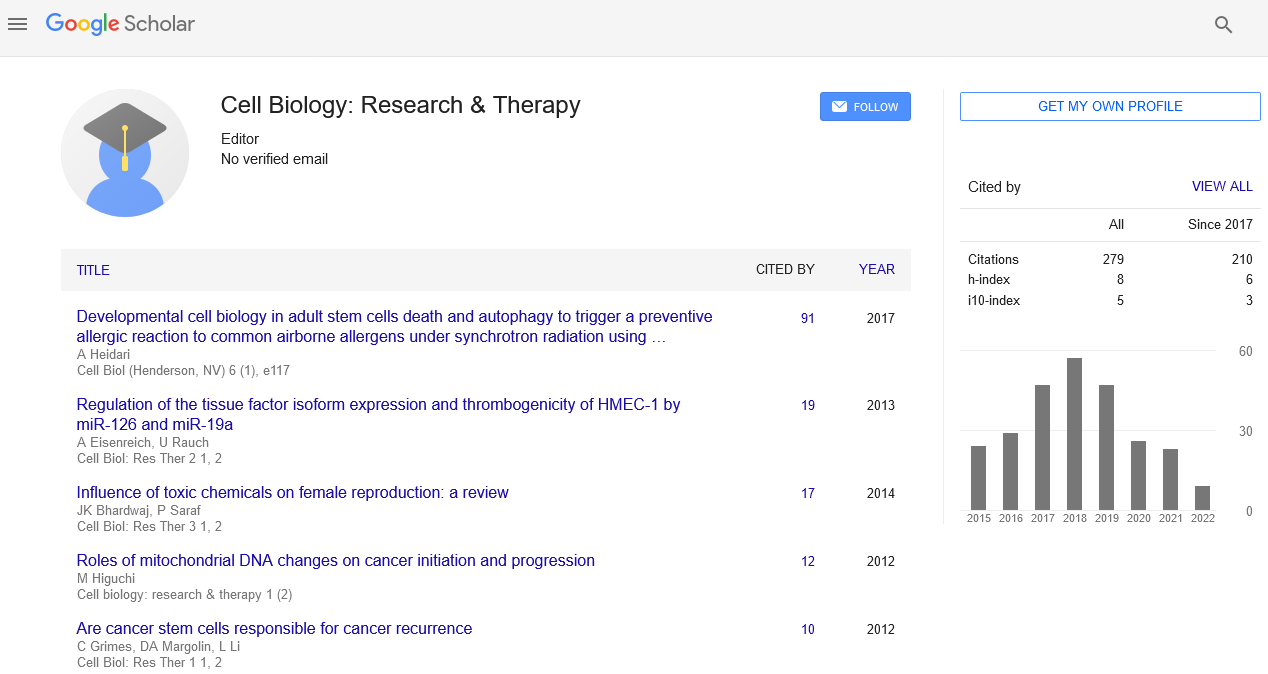Commentary, Cell Biol Vol: 12 Issue: 3
Implications for New Therapeutic Approaches: The Role of Autophagy in Cancer Cells
Malcolm Boyd*
1College of Life Sciences, University of Leicester, Leicester, UK
*Corresponding Author: Malcolm Boyd,
College of Life Sciences, University of
Leicester, Leicester, UK
E-mail: boydmalcolm04@gmail.com
Received date: 02 September, 2023, Manuscript No. CBRT-23-116141;
Editor assigned date: 04 September, 2023, PreQC No CBRT-23-116141(PQ);
Reviewed date: 18 September, 2023, QC No CBRT-23-116141;
Revised date: 25 September, 2023, Manuscript No CBRT-23-116141(R);
Published date: 05 October, 2023, DOI: 10.4172/2324-9293.1000188.
Citation: Boyd M (2023) Implications for New Therapeutic Approaches: The Role of Autophagy in Cancer Cells. Cell Biol 12:3.
Description
Autophagy is a fundamental cellular process involved in the maintenance of cellular homeostasis and the removal of damaged organelles and proteins. In recent years, its role in cancer has garnered significant attention. Autophagy, a highly conserved cellular process, plays a major role in maintaining cellular homeostasis by recycling damaged organelles and proteins. It involves the formation of doublemembraned vesicles called autophagosomes, which engulf and degrade cellular components in lysosomes. Dysregulation of autophagy has been implicated in various diseases, including cancer. The role of autophagy in cancer is multifaceted, as it can either promote tumor growth or act as a tumor suppressor.
Autophagy and tumor genesis
Tumor suppressor role: In the early stages of cancer development, autophagy often acts as a tumor suppressor by preventing genomic instability, reducing inflammation, and maintaining cellular fitness. Autophagy helps to remove damaged mitochondria and other cellular components, thereby limiting the accumulation of oxidative stress.
Pro-tumorigenic role: Conversely, in established tumors, cancer cells can hijack the autophagic machinery to promote their survival and growth. Autophagy can provide nutrients and energy to cancer cells under conditions of nutrient deprivation and hypoxia, which are common within the tumor microenvironment.
Autophagy inhibition: Targeting autophagy with pharmacological inhibitors has been explored as a potential cancer treatment strategy. Chloroquine and hydroxychloroquine are among the most studied autophagy inhibitors. By blocking the fusion of autophagosomes with lysosomes, these drugs impair the autophagic process and sensitize cancer cells to chemotherapy and radiation therapy.
Autophagy induction: On the other hand, some cancer therapies aim to induce autophagy in cancer cells as a means of promoting their demise. Certain cytotoxic agents and targeted therapies can trigger autophagy as a form of programmed cell death, known as autophagic cell death or autophagic apoptosis.
Combination approaches: Combining autophagy modulation with other cancer treatments is an emerging strategy. The goal is to enhance treatment efficacy while minimizing resistance. Combinations of autophagy inhibitors and conventional chemotherapy or immunotherapy are being explored in preclinical and clinical studies.
Context dependency: The dual role of autophagy in cancer underscores the importance of understanding context-specific effects. The stage of cancer, the tumor microenvironment, and genetic factors all influence whether autophagy promotes or inhibits tumor growth.
Biomarkers: Identifying reliable biomarkers to predict the response of cancer patients to autophagy-modulating therapies is a significant challenge. This would enable the selection of appropriate patients for targeted treatments.
Resistance mechanisms: Resistance to autophagy modulation therapies can emerge, necessitating ongoing research to uncover and overcome these mechanisms.
Precision medicine: Personalized approaches to autophagy modulation in cancer therapy, considering individual patient profiles and tumor characteristics, shows great result for improving treatment outcomes.
Conclusion
Autophagy's role in cancer is complex, with context-dependent effects on tumor development and progression. Understanding this intricate relationship provides a basis for developing novel therapeutic strategies for cancer treatment. Autophagy modulation, through inhibition or induction, offers exciting opportunities to enhance the effectiveness of existing cancer therapies. Continued research into the molecular mechanisms and context-specific roles of autophagy in cancer will be essential for realizing the full potential of autophagytargeted treatments and advancing precision medicine in oncology.
 Spanish
Spanish  Chinese
Chinese  Russian
Russian  German
German  French
French  Japanese
Japanese  Portuguese
Portuguese  Hindi
Hindi 